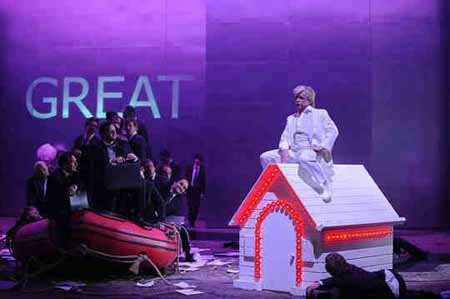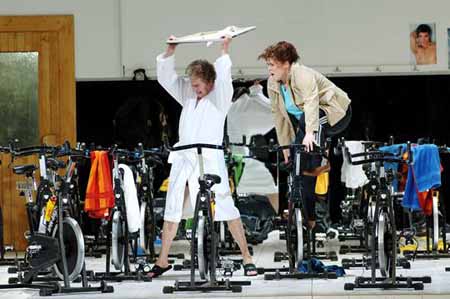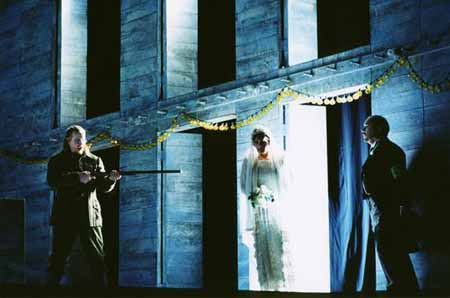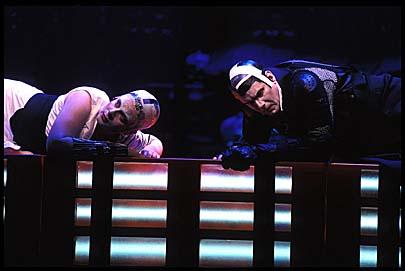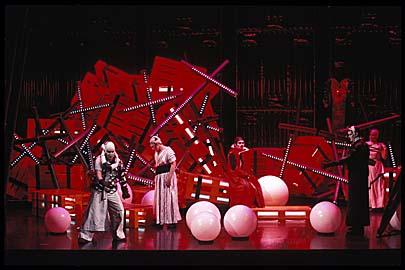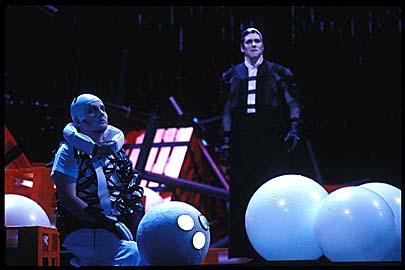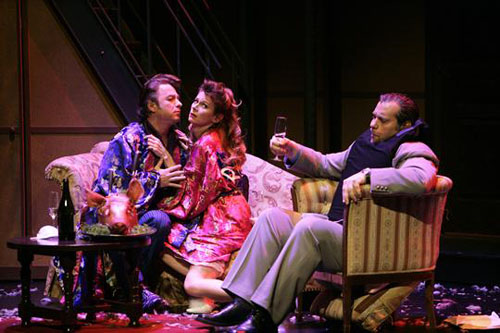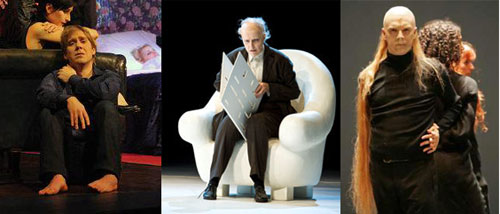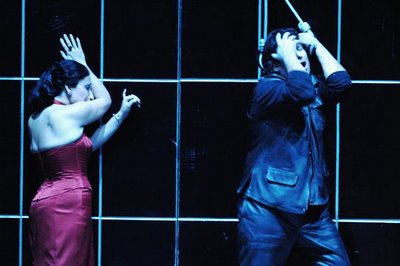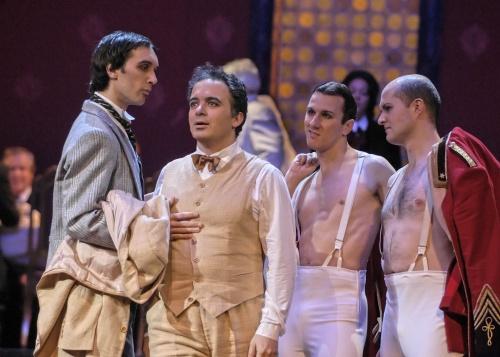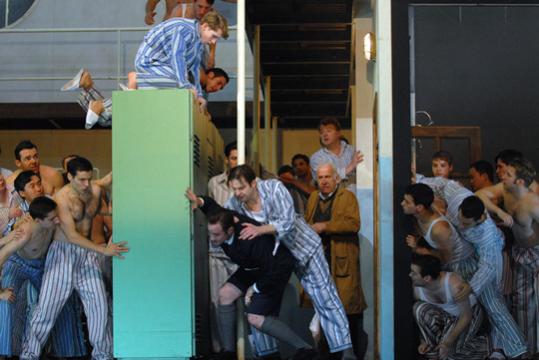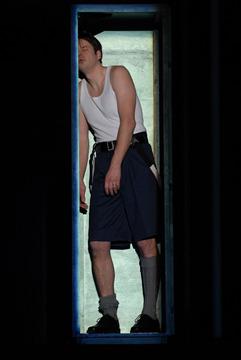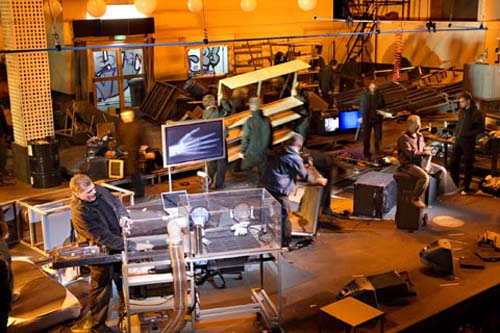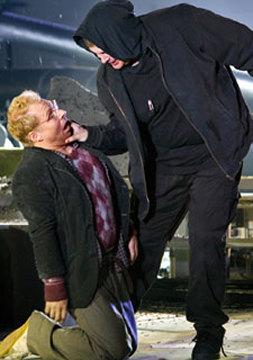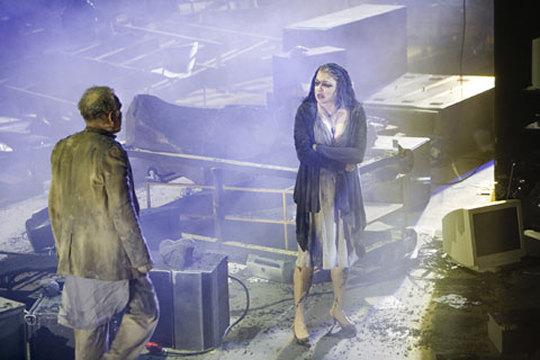
29 January 2008
21 January 2008
Regie on the rocks
You've all worked out that the previous Regie quiz was Don Carlos in the Peter Konwitschny production. So now, how about a few guesses what opera these two photos might represent? (Please, any of you who already know the production, please let the others try to work it out!)
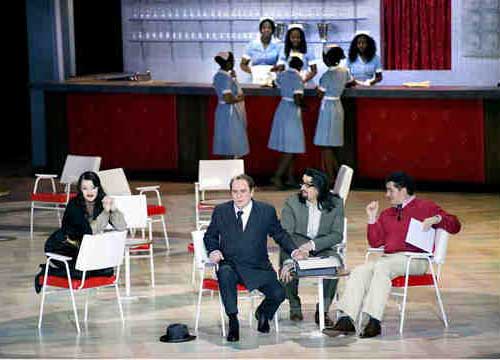
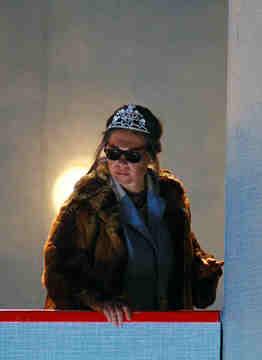


19 January 2008
Spanish inquisition
Given the current lively discussion of Peter Konwitschny's regie of Don Carlos, La Cieca thought the cher public might like to see (and to debate) the "Celestial Voice" scene from this production.
UPDATE: Since the discussion has now broadened to involve the context of this scene, La Cieca has substituted a player with a selection of scenes from this production.
UPDATE: Since the discussion has now broadened to involve the context of this scene, La Cieca has substituted a player with a selection of scenes from this production.
17 January 2008
Regie, Steady, Go!
Two images from a recent production of ... well, you tell me!
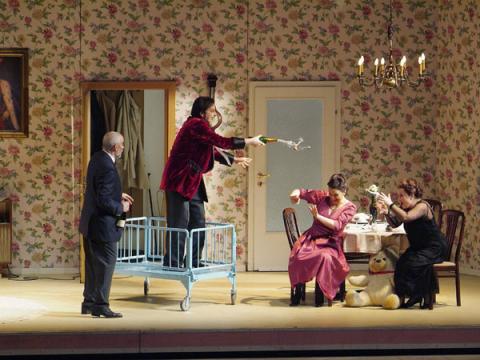
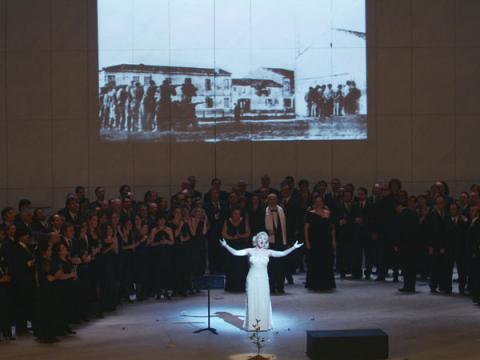
Our previous Regie riddle? It's Tristan und Isolde, of course, directed by "The Cher of Regisseurs," that one-named wonder Rosalie.


Our previous Regie riddle? It's Tristan und Isolde, of course, directed by "The Cher of Regisseurs," that one-named wonder Rosalie.
14 January 2008
Journalist desperately seeking emoticon for sarcasm
"Seattle Opera did more than put an intermission between the two scenes. It restored, or opened, to use opera terminology, customary cuts in the score and invented a dream sequence to open Act 2, using music written by Leoncavallo but not for Pagliacci. Two mimes, Comedy, in white, and Tragedy, in black, open the opera and stay a part of the action until the end, when Comedy has lost the game. What an effective device." -- R. M Campbell, seattlepi.com
13 January 2008
09 January 2008
76 Trombones Led the Big Regie
So, tell me, what is this jolly-looking opera? (UPDATE: La Cieca has added a second image from the same production.)
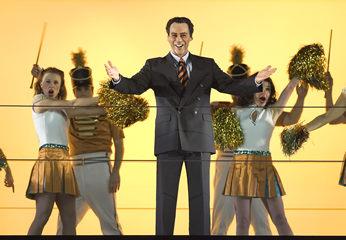
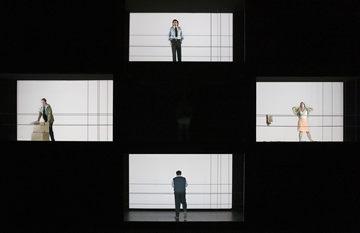
The previous Regie was Die Fledermaus, the first act trio for Rosalinde, Alfred and Frank.


The previous Regie was Die Fledermaus, the first act trio for Rosalinde, Alfred and Frank.
04 January 2008
Einen guten Rutsch ins Neuinszenierung!
19 December 2007
15 December 2007
Flawless?
When she first saw this photo, La Cieca thought, well, it's about time we saw an all-bear production of The Lisbon Traviata. But, in point of fact, that delightful Terrance McNally play is not what this picture depicts.
So La Cieca puts it to you, cher public What is this opera?
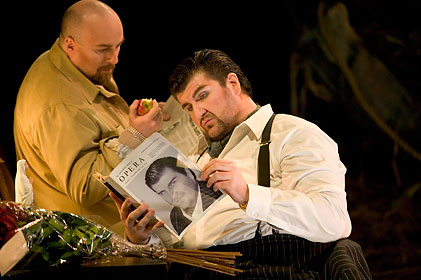
So La Cieca puts it to you, cher public What is this opera?

13 December 2007
08 December 2007
Barenboim sings again!
Introducting a new guest critic, Giulia Grisi, who blogs regularly for "Il Corriere della Grisi."
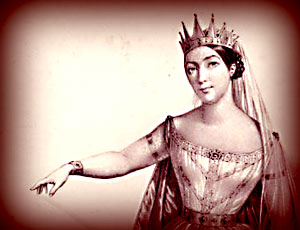 La Scala's 2007-8 opera season opened last night (December 7) with a new production of Tristan und Isolde. The Milanese theatre hadn't presented Wagner's masterpiece since 1978, when Carlos Kleiber's masterful interpretation became an instant classic, in spite of a not-so-sensational cast (Wenkoff, Ligendza, Baldani, Moll).
La Scala's 2007-8 opera season opened last night (December 7) with a new production of Tristan und Isolde. The Milanese theatre hadn't presented Wagner's masterpiece since 1978, when Carlos Kleiber's masterful interpretation became an instant classic, in spite of a not-so-sensational cast (Wenkoff, Ligendza, Baldani, Moll).
Superintendent Stéphane Lissner must have thought it was time to try it again, counting on the power of the music and the experienced production team, with conductor Daniel Barenboim, director Patrice Chéreau and set designer Richard Peduzzi (of the 1976 Bayreuth Ring). After all, everyone knows that singers aren't really that important in Wagner, nowadays... are they?
The rehearsals period was something less than idyllic because of problems with the unions, yet Barenboim's conducting can be called ideal: a beautiful, clean orchestra, rich in color and atmosphere -- in fact much more "singing" than the singers on stage. we can indeed describe Daniel B. as the true "deus ex machina" and the real protagonist of the night. Conducting from memory, he has led the La Scala orchestra towards a real Wagnerian sound and has made everything he could to help the singers, literally breathing with them, reducing the orchestral volume when they needed it, pumping it up when they could not finish a phrase. Through his conducting have felt the epic, the passion destroying every rule, the magnificent night, the eternal suffering -- in short, the Wagnerian drama we couldn't see on stage, where a great, realistic canal boat, stark grey walls, some staircases and a lot of trench coats were visible. Chéreau and Peduzzi presented their familiar Wagnerian mise en scène, utterly realistic and utterly ugly, with some dramaturgical errors.
This "avant-garde" art is so past and over that only an theater so behind the times as La Scala can appreciate it. Twenty-three years have passed since this team's modern dress Lucio Silla production here -- and even that was not a success.
Waltraud Meier is a brilliant actress, ravishing and sexy. However, her voice is faded in the lower octave (that's quite strange, since she began as a mezzo) and in the upper range she shrieks more than she sings. Often out-of-tune, she was able to sing the role to the end thanks to her experience and to Barenboim, who aided her in every possible way, underlining some beautiful intentions in her interpretation and drawing a veil over some glaring flaws in her singing (especially in the Liebestod).
Ian Storey is more a crooner than a Wagnerian tenor: a small, short voice, with insufficient projection, he was neither a hero nor a lover nor a dying prince. Tristan's love and drama were confined to the orchestral pit. Brangäne, the Wagner "specialist" Michelle De Young, offered the worst vocal performance of the night, with the possible exception of Matti Salminen's superannuated and shouty König Marke. Handsome Gerd Grochowski barked a rather conventional Kurwenal.
To make a long story short, La Scala has presented a Tristan und Isolde for orchestra and conductor. We may be too "addicted to voices", but without Barenboim and his experience in minimizing the singers' problems, this opening night would have been nothing special. -- Giulia Grisi, translated by Antonio Tamburini.
 La Scala's 2007-8 opera season opened last night (December 7) with a new production of Tristan und Isolde. The Milanese theatre hadn't presented Wagner's masterpiece since 1978, when Carlos Kleiber's masterful interpretation became an instant classic, in spite of a not-so-sensational cast (Wenkoff, Ligendza, Baldani, Moll).
La Scala's 2007-8 opera season opened last night (December 7) with a new production of Tristan und Isolde. The Milanese theatre hadn't presented Wagner's masterpiece since 1978, when Carlos Kleiber's masterful interpretation became an instant classic, in spite of a not-so-sensational cast (Wenkoff, Ligendza, Baldani, Moll).Superintendent Stéphane Lissner must have thought it was time to try it again, counting on the power of the music and the experienced production team, with conductor Daniel Barenboim, director Patrice Chéreau and set designer Richard Peduzzi (of the 1976 Bayreuth Ring). After all, everyone knows that singers aren't really that important in Wagner, nowadays... are they?
The rehearsals period was something less than idyllic because of problems with the unions, yet Barenboim's conducting can be called ideal: a beautiful, clean orchestra, rich in color and atmosphere -- in fact much more "singing" than the singers on stage. we can indeed describe Daniel B. as the true "deus ex machina" and the real protagonist of the night. Conducting from memory, he has led the La Scala orchestra towards a real Wagnerian sound and has made everything he could to help the singers, literally breathing with them, reducing the orchestral volume when they needed it, pumping it up when they could not finish a phrase. Through his conducting have felt the epic, the passion destroying every rule, the magnificent night, the eternal suffering -- in short, the Wagnerian drama we couldn't see on stage, where a great, realistic canal boat, stark grey walls, some staircases and a lot of trench coats were visible. Chéreau and Peduzzi presented their familiar Wagnerian mise en scène, utterly realistic and utterly ugly, with some dramaturgical errors.
This "avant-garde" art is so past and over that only an theater so behind the times as La Scala can appreciate it. Twenty-three years have passed since this team's modern dress Lucio Silla production here -- and even that was not a success.
Waltraud Meier is a brilliant actress, ravishing and sexy. However, her voice is faded in the lower octave (that's quite strange, since she began as a mezzo) and in the upper range she shrieks more than she sings. Often out-of-tune, she was able to sing the role to the end thanks to her experience and to Barenboim, who aided her in every possible way, underlining some beautiful intentions in her interpretation and drawing a veil over some glaring flaws in her singing (especially in the Liebestod).
Ian Storey is more a crooner than a Wagnerian tenor: a small, short voice, with insufficient projection, he was neither a hero nor a lover nor a dying prince. Tristan's love and drama were confined to the orchestral pit. Brangäne, the Wagner "specialist" Michelle De Young, offered the worst vocal performance of the night, with the possible exception of Matti Salminen's superannuated and shouty König Marke. Handsome Gerd Grochowski barked a rather conventional Kurwenal.
To make a long story short, La Scala has presented a Tristan und Isolde for orchestra and conductor. We may be too "addicted to voices", but without Barenboim and his experience in minimizing the singers' problems, this opening night would have been nothing special. -- Giulia Grisi, translated by Antonio Tamburini.
Labels: guest critic, la scala, regie, wagner
